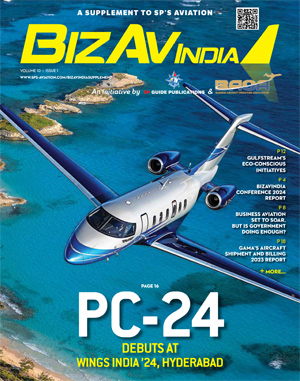Licence to Fly
With the modernisation of flight training in India there are also opportunities available here to help get one a pilot licence

The last decade has seen a paradigm shift in Indian aviation. From the dominance of the legacy carriers to a modern mosaic of a new breed of low-cost and full fare airlines that fly the sky today. We must be proud to say that this expansion that has come about has put Indian aviation on the world stage despite the obstacles and challenges that the industry faces today.
From what was once a coveted job (airline pilot) has become more of a profession that the youth choose to take after they finish their college studies. Obtaining a professional pilot’s job has become very competitive and clearly you need to be very proficient in your skills and knowledge, but what is certain is that there are a lot more opportunities in the market than there were even a decade ago.
In the earlier years there was an extremely narrow margin of availability of jobs and that clearly meant only a few got the opportunity of pursuing an airline pilot career. However, with the dawn of the low-cost airlines the opportunities increased and it gave the larger public an opportunity that they only dreamt about. Non-scheduled and private aviation jobs are and always have been very few and far between and difficult to secure as the requirement is extremely small as the airplanes used are very exclusive and mission specific.
From what was once a fleet of only about 70 airplanes of the legacy carriers has now almost tripled to over 220 airplanes in the country today, sparking an acute shortage of pilots as well. However for the ab initio pilot, it would always be a case of catch-22. Most requirements are for experienced jet endorsed pilots, and the only way most of them can get their experience is by joining an airline.
Most ab initio pilots these days do their training abroad. With the modernisation of flight training in India there are also opportunities available here to help get one a pilot licence. It is also not uncommon for ab initio pilots these days to get their type rating done themselves before they join their respective airline. There are professional simulator training institutes such as FSTC and CAE which have set up shop in India offering experienced and ab initio pilots an opportunity of obtaining an Airbus or Boeing endorsement at very competitive rates, thus saving costs on foreign air travel.
Most new joiners are fresh from their CPL training, entering the maze of the airline industry. In contrast to having hours of flight experience, it is the right knowledge now that is a key requirement to getting a job in one of the airlines in the industry today. This paradigm shift is something that some may choose to critique but it has always been an airline practice especially when demand outstrips supply.
With the launch of other private flight training institutes in the country, there has been a big advancement in the training standards in India. Most students are fresh from college or with their12th standard qualifications eager to get their hands on an airplane. With a timeline being about one year it seems to be the less preferred route as there are quicker options available abroad, however the trend of doing one’s training in India is gradually on the increase.
With respect to professional training, it is always a challenge for an ab initio pilot who has just joined a professional airline as expectations are high and there is a lot of pressure to perform. Since the aviation industry itself is comparatively new, it is important to always be in a learning mindset and to have an attitude of gratitude, which is important as the newer generation of pilots have been quick to assimilate the knowledge and skills required in a modern flight deck, but there is always an ever present danger on over reliance on automation. Refreshing one’s fundamental flying skills is as important as any other aspect of flying and guards against complacency.
With the launch of new airlines and many more players waiting in the wings, the current aviation scenario has brought about a lot of change and it is fair to say that it has been for the better. Looking forward, the road ahead has many obstacles and challenges, in infrastructure, policies and procedures, but we are very confident that there will be improvement in all aspects of Indian aviation.
Capt Sanjay Menzies is Chief Pilot/Head of Operations & Training, Poonawalla Aviation, and Capt Bruce David is Senior Captain, IndiGo Airlines





